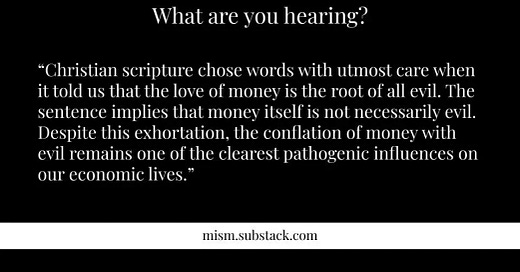In this post, I included:
My brief essay on the unheard story of money (second edition).
A list of sources I’ll be examining in upcoming episodes of the MISM podcast.
My first micro-podcast: “Naming Kleptocrats”
MISM is my free Substack dedicated to understanding media as human extensions. To receive my posts by email, subscribe.
Defense Against Kleptocracy
I wouldn’t try to write the untold story of money because I’m not ready for the challenge. The untold story of money, just as the untold story of anything, hasn’t been told because no author we know has yet risen to the challenge. By contrast, the unheard story of money, just as the unheard story of anything, is easy to write based on existing texts.
Unheard stories are part of what the psychoanalyst Otto Rank described as the massive overproduction of truth that can’t possibly be consumed. These stories are out there — freely accessible but tragically unconsumed and wasted. I’ll discuss the bibliography of my sources below, but first, I’ll focus on why the unheard story of money is easy to write but often impossible to hear.
When the sound of this story passes through the filter of ideology, the story becomes inaudible, both to the people who have money and to the people who don't. This inaudible story organizes our economic reality, but our attention favors the stories we hear — the stories easily translatable into text and marketable through our media.
Even though they distort the underlying reality, the audible stories do for us what the light from the lamp post does for Nasrudin. In the parable, Nasrudin looks for his house keys under the lamp post even though he had lost the keys in an unlit area. The mind has a natural preference for comprehensibility, even when this preference proves sub-optimal or self-defeating.
There are ways of working around this quirk of human attention. Over the centuries, writers adding to the overproduction of unheard stories have used myth, metaphor and poetry to at least hint at the shape of these stories. With these departures from plainly propositional statements, writers working within the constraints of the textual medium found ways to suggest what they couldn’t state. The best among them have sparked life-changing realizations generally inexpressible through text. One thing these workarounds have in common is that they require writers to choose words carefully — far more carefully than they normally do.
For example, I believe that Christian scripture chose words with utmost care when it told us that:
…The love of money is the root of all kinds of evil. Some people, eager for money, have wandered away from the faith and pierced themselves with many griefs.
This verse in 1 Timothy 6:10 (KJV) suggests that money itself is not necessarily evil, but the love of money is not only evil but also the root of all kinds of evil. Through the prism of this verse, we can think of money problems as disorders of love. We can also think of hatred, including the hatred of money, as a widespread disorder of love. I suggest that, just as the love of money is the root of all kinds of evil, so too is the hatred of money. Despite the exquisitely worded exhortations of Christian scripture and countless other sources, the conflation of money with evil remains one of the clearest pathogenic influences on our economic lives.
Whether people suffer from the love of money or the hatred of money, these disorders make people economically toxic. This pathogenesis renders people immune to language and incapable of conscious dialogue about money.
False Questions
In response to this incapacity, I offer you my own carefully chosen words about the unheard story of money and one of the reasons for its inaudibility.
There are stories about money that we cannot hear because of the dominance of false questions in our conversations about money, including conversations with ourselves. Perhaps the most familiar false question is “How can I make more money?” Or “Why am I not making more money?” Or “Why am I now making less money?” In my view, these are all false questions.
By contrast, true questions include “How have I made money? and “How have I lost money? For me, one of the truest and most fruitful questions about money isn’t even explicitly about money; it’s inspired by Carl Jung’s suggestion to notice what supports us when nothing supports us. Another true question is “What am I willing to sacrifice for money?”
Responses to Kleptocracy
We may lose money due to the force of chance or the loss of vigilance. Not much we can do about chance, but we can always improve our vigilance. For participants in kleptocratic economies, there are many things to be vigilant about, starting with attention and money.
Even more important than cultivated vigilance, pattern recognition is the golden road to altered states of monetary consciousness. For example, in the first episode of the M2D podcast, my guest and I discussed a well-researched trade-off that helps explain a self-defeating pattern in our relationship with money: In the age of radically accelerating change, many of the known ways of making money are becoming obsolete, while many of the new ways are experimental and untested. In response to this clearly observable pattern, most people are either doubling down on what no longer works, or they are “breaking bad” even though this path “pierces them with many griefs”.
What’s Next? More Reading
In the next few episodes of the MISM podcast, I’ll be exploring ways of breaking out of the cage of self-defeating false choices. With this goal in mind, I’ll focus on close readings of the following sources:
Links
Money as Medicine — Clinicism, Cash Transfers, and the Political–Economic Determinants of Health (The New England Journal of Medicine, 4/10/2024)
Salve Lucrum: The Existential Threat of Greed in US Health Care (JAMA, 1/30/2023)
David Graeber on the Origins of Money (Deficit Owls, 2018)
Power Outage: On the Thermodynamics of History (Lapham’s Quarterly, Winter 2024)
Six People Who Have Ruined Our Relationship With Money (The Financial Diet, 2022)
Why 10 Million Men Have "Given Up" on Work (How Money Works, September 2023)
Lewis H. Lapham speaks with Eugene McCarraher (Lapham’s Quarterly, 12/6/2019)
It’s the creators’ economy, stupid (Hamish McKenzie, 10/9/2024)
References
The chapter on money in Marshall McLuhan’s Understanding Media: The Extensions of Man.
Toward a New History of Needs by Ivan Illich.
The Enchantments of Mammon: How Capitalism Became the Religion of Modernity by Eugene McCarraher
Shift of Perspective
With the help of these sources, I intend to shift from the transcontextual perspective to context-specific manifestations of Second-Order Ignorance (SOI). In this lengthy essay, I discussed:
…the value of a perspective that examines highly polemical issues while staying above the fray of mind-warping controversies. Once the perspective descends into critiques of specific diagnostic and regulatory paradigms — not to mention individual practitioners — we lose the transcontextual view. There’s a time and place for context-specific critiques, but in the current climate, the loss of transcontextuality often means that:
Firestorms quickly erupt
The level of noise pollution in the media spikes
People start speaking without listening using words whose meanings they assume they understand
Dialogue becomes impossible, and
Truth has no chance of being heard
Noisy media are inhospitable to truth and beauty. We can only hear truth in silence. We can only behold beauty without distractions.
The transcontextual perspective is not a way of avoiding fights. In fact, it's a way of picking fights wisely. In dealing with “fractal falsehood”, this perspective helps:
Overcome the information overload attendant on context-specific critiques, and
Formulate meta-principles applicable to specific contexts.
I advisedly chose the word ‘descend’ to describe the shift of perspective from the transcontextual to the context-specific. As in Zarathustra’s Prologue1, this is a kind of “down-going”. On this journey, I’ll be speaking and writing about the problem of kleptocracy without the transcontextual lens, without the veil of metaphor. Here, I’ll be naming the servants of kleptocracy, starting with Substack.
Naming Kleptocrats
Substack in the Rear-View Mirror
Start a Substack! A 'channeled' message for readers seeking shelter in the wilderness of the kleptocratic attention economy (M2D, 1/31/2024)
My Problem Statement: Substack Doesn’t Work for Me (M2D, 7/9/2024)
Substack Is Social Media, Not Business: Biting Hands Which Don't Feed Us (Full Dashclosure, 10/8/2024)
Substack's Economic Capture Is Reality (Full Dashclosure, 10/10/2024)
Closing Message

What Are You Hearing?
What have you heard lately about the root of evil, or the love or hatred of money? And what are you hearing about kleptocracy and pattern recognition? Feel free to respond by email. If you’d like to join me as a guest on one of my podcasts, start by filling out this form. In the meantime, subscribe.





Money is a tool not a end in itself.